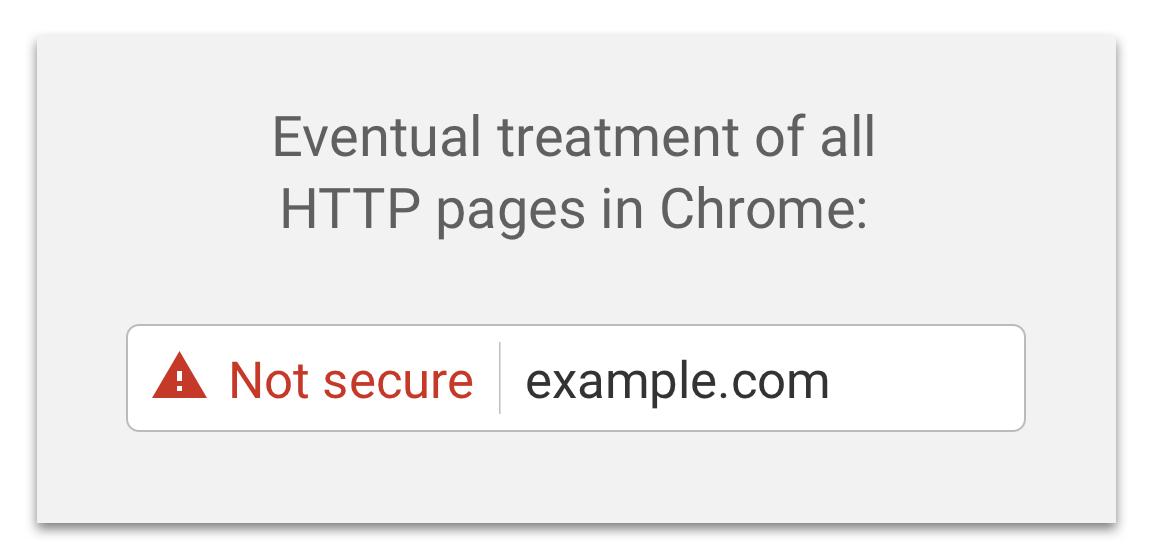Give your business leads a boost this July by adding HTTPS and SSL Certificates to your website maintenance.
For the past several years, Google has been advocating for a more secure Internet by promoting the use of HTTPS (Hypertext Transfer Protocol Secure) and SSL (Secure Sockets Layer) certificates on all web pages. According to a recent Google study, over 68 percent of Chrome user traffic on Android and Windows is now protected by HTTPS and SSL. Over 78 percent of Chrome traffic on Chrome OS and Mac is protected as well. Google’s HTTPS and SSL certificates priority means your website could be losing thousands of potential business leads without it.
In order to understand why HTTPS and SSL certificates are important for your business, we’ll explain what HTTPS and SSL mean, why you should have them, and why it is important to obtain them for your website in order to comply with Google Chrome’s July updates.
First, what are HTTPS and SSL certificates?
Originally, HTTPS and SSL certificates were used for eCommerce to protect consumers on sites where they were making purchases. Now, certificates are used on most web pages. According to Google, HTTPS is an Internet communication protocol that “protects the integrity and confidentiality of data between the user’s computer and the site.” This means that the data your customers are sharing with you will remain safe from potential hackers.
In order for HTTP to become HTTPS, your site needs an SSL certificate. SSL certificates have two primary functions: handling the encryption between you and the server to ensure the data being exchanged cannot be altered during transfer, and guaranteeing you are interacting with the intended website. The level of certification your website chooses can impact how secure your website appears to visitors. There are three levels of certification you can choose from based on validation:
- Domain validated certificates — Must verify the organization has ownership of the requested domain. Typically used for small to medium level website owners who want to only verify their domain.
- Organization validated certificates — Must confirm the organization’s identity. Typically used for businesses accepting credit cards for e-
- Extended validation certificates — Must verify the ownership, organization information, physical location, and legal existence of the company. Typically used for large companies processing sensitive financial transactions such as PayPal or Citi Bank.
Why are HTTPS and SSL Important?
Data shared between the user and the server isn’t secured over HTTP, meaning anyone who intercepts it can read it. HTTPS and SSL certificates encrypt this information and reassure business owners that third parties aren’t sharing their customer data. Customers also have peace of mind knowing the integrity of their data is safe and can’t be intercepted by anyone other than the intended business. Still not convinced? Here are three other reasons why HTTPS and SSL are important for your website:
SEO Ranking. If you want to help your SEO ranking on Google and end up on first page results, HTTPS and SSL certificates are important to help you get there. As part of their HTTPS Everywhere initiative, Google gives sites with encrypted connections a boost in SEO rankings over non-encrypted sites. The boost isn’t very large, but could be just enough for you to come out ahead of your competitors.
Personal Data. The more traffic you bring to your website, the more chances you create for someone to intercept and steal important customer data. An SSL certificate doesn’t guarantee your site complete security, but it does protect the things that matter to your customers. Credit card transactions, data transfers, and login information are some examples of customer data you don’t want misused by website hackers.
Credibility. The most important thing a business can have is credibility, and once you’ve lost it, it is hard to earn back. According to Moz, businesses risk losing as many as 22 percent of customers when they find one negative article while they consider buying a product. Depending on your web browser, you will see a warning if your site doesn’t have HTTPS. If your customers go to your website and receive a security warning, it can raise some serious red flags. However, when your customers go to your site and see that their connection is secure and has no warning, they will know you take their privacy seriously and encourage repeat business.
The Future of HTTPS and SSL
At the Chrome Dev Summit in November 2016, Google announced that it had north of 2 billion installs in active use across all desktops and mobile devices. According to StatCounter, in the past year, over half of all users chose Chrome for web browsing, making Chrome the most accessed web browser in the world. This means it is more important than ever to make sure your website complies with Google Chrome’s current and future HTTPS policies.
Beginning in July, Google Chrome will mark all HTTP sites as “Not Secure” potentially creating a large loss in business leads from customers who don’t trust your site. In addition, Chrome will also be updating the way it displays secure websites.
Currently, all HTTPS secure websites accessed in Chrome are labeled with a green lock and language reading, “Secure”. In October 2018, the green label and secure mark will be removed from all HTTPS sites and a red “Not Secure” label will be added to sites with HTTP. In order to maintain your credibility, it is important to make sure your website has HTTPS before these new changes come into effect.
While moving from HTTP to HTTPS and SSL certificates may seem as simple as adding an additional letter to your URLs, in actuality you’re adding an impressive benefits package to your business. For customers, it means protection from potential hackers, reassurance that your website is the intended one, and user trust that translates into business benefits. For business owners, it helps ensure your customer data is protected to prevent loss in credibility, creates more business leads with an SEO boost, and encourages repeat business from your customers.








